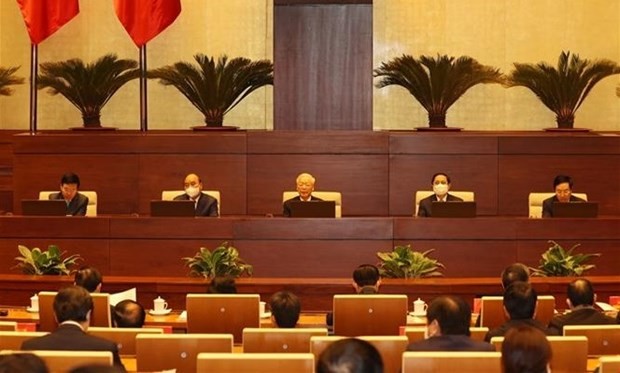
Viet Nam consistent with independence, self-reliance spirit
Latest
 |
| Party General Secretary chairs the National Conference on Foreign Affairs. (Photo: VNA) |
In 1919, Nguyen Ai Quoc, the then name of President Ho Chi Minh, joined the French Socialist Party and sent an eight-point petition to the Versailles Conference, demanding the French Government to recognise rights to freedom, democracy and equality of Vietnamese people. The event marked the beginning of Viet Nam’s Party diplomacy which was founded by the President.
A decade later, the Communist Party of Viet Nam (CPV) was established in 1930, guiding the way for Vietnamese people to win independence from feudalism and colonialism and setting the scene for the birth of the Democratic Republic of Viet Nam in 1945. From a semi-feudal colony, Viet Nam has officially become an independent and united country.
As the first foreign minister of modern Viet Nam, President Ho Chi Minh initiated three pillars of the country’s foreign policy, namely Party-to-Party diplomacy, State-to-State diplomacy and people-to-people diplomacy. His diplomacy philosophy promotes the principles of national independence, peace and friendship, and using diplomacy to deter conflicts.
After the Great Spring Victory in 1975 which unified the country, Viet Nam entered a new era – the reconstruction phase, according to former Deputy Prime Minister Vu Khoan, the 6th Party Congress in 1986 introduced two new points of view – recognizing internationalism and market economy, paving the way for the opening of the country.
The Politburo later issued Resolution No.13 shaping Viet Nam’s foreign policy which placed the highest priority to protecting the national interest and maintaining an environment of peace and international cooperation to build and safeguard the nation. This has contributed to the world’s peace, independence, democracy and social progress.
During the “Doi Moi” (Renewal) period, Viet Nam has been consistent with its foreign policy of independence, self-reliance, peace, friendship, cooperation and development, diversification and multilateralisation; being a friend, a reliable partner and a responsible member of the international community.
Foreign Minister Bui Thanh Son has once said implementing the Party’s sound foreign policy has helped the country sustain a peaceful, stable and favourbale environment for “Doi Moi” process, firmly safeguard the national independence, sovereignty, unity, and territorial integrity, and heighten its reputation.
The National Conference on Foreign Affairs was opened by the Politburo and CPV Central Committee’s Secretariat for the first time on December 14, aiming to thoroughly popularise the 13th Party Congress’ Resolution and foreign policy among Party members and the public.
According to standing member of the CPV Central Committee’s Secretariat Vo Van Thuong, the event will provide a comprehensive review of Viet Nam’s foreign affairs as well as regional and global situation in recent time, and map out tasks and plans for the coming time.















